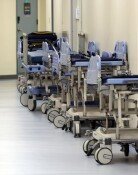Korea in Financial, Political Pickle
Koreans experienced negative growth twice over the past 46 years since the first economic development plan started in 1962. The second oil shock drove down the economic growth rate to minus 1.5 percent in 1980 and the financial crisis in 1998 forced the rate to plummet to minus 6.9 percent. The upcoming typhoon is the third oil shock combined with high inflation and low growth stagflation, said former Prime Minister Nam Deok-woo. This crisis is likely to be more serious and longer than previous oil shocks.
The current crisis began as large economies such as China and India grew through globalization, pushing raw material prices up and the U.S. economy, the center pillar of the world economy suffered a subprime mortgage crisis, which led to the weak dollar and pushing material prices even higher.
American and European think tanks diagnosed that the rapid economic growth of populous countries restructured global wealth and that the paradigm of the global economy is in transition. The think tanks are focusing on ways to maintain the two continents hegemony amid these changes.
But Korea does not seem to give a serious thought about it. Each member of society is not willing to face the crisis head-on and instead, they are regressing, calling for protectionism or finding a scapegoat. Civil servants, employees in state-owned companies, labor unions of large businesses, and those in the education and health care sector are taking this crisis to fail the Lee Myung-bak administrations reform plan.
Already, the ruling Grand National Party seems to take a step back in the reform of state-owned companies, yielding to their demand. As former Deputy Prime Minister and Economy Minister Kim Man-je said, all Koreans are trying to avoid solving the problem that has the only solution of sharing burden and enhancing economic efficiency.
The crisis is magnified by the absence of representative democracy.
The candlelight vigils, which started as a protest against U.S. beef imports that could be infected with mad cow disease, have brought about a street politics crisis combined with political movements and strikes. The rule of law is collapsing, reason, rationality and scientific judgment are disappearing, and demagoguery, uneasiness, mob mentality and political interests are dominating the situation. The recent protest of the Korea Cargo Transport Workers Union are also leading to a series of strikes involving the construction workers and the Korean Confederation of Trade Unions.
Democracy that was represented through the legitimate process of presidential and general elections are overwhelmed by street politics under the cause of direct democracy. The National Assembly, which is supposed to read the minds of the public and sort out irrational arguments, has given up its function. The presidential office and the government, which are supposed to play the critical role in crisis management, are putting all their focus on measures to cope with the beef import issue and the Cabinet reshuffle.
It has been more than 15 days since the 18th National Assembly members began being paid from taxpayers money, but the National Assembly has not yet opened its session. This shows the loss of politics.
This week will be critical for Korea to overcome internal crisis and rise up to external challenges. President Lee Myung-baks reshuffle plan, new presidential office members and new Cabinet members will be announced within this week and Trade Minister Kim Jong-hoon will announce the outcome of an additional negotiation with the United States over the beef issue around Tuesday.
Grand National Party floor leader Hong Joon-pyo and United Democratic Party counterpart Won Hye-young will have a second meeting to discuss opening the 18th National Assembly session.
Kim Yong-ho, a professor of politics at Inha University, said, If representative democracy does not work, no one will be able to control street politics, and the internal crisis will grow until it reaches the point where it is irreversible.
eye@donga.com







